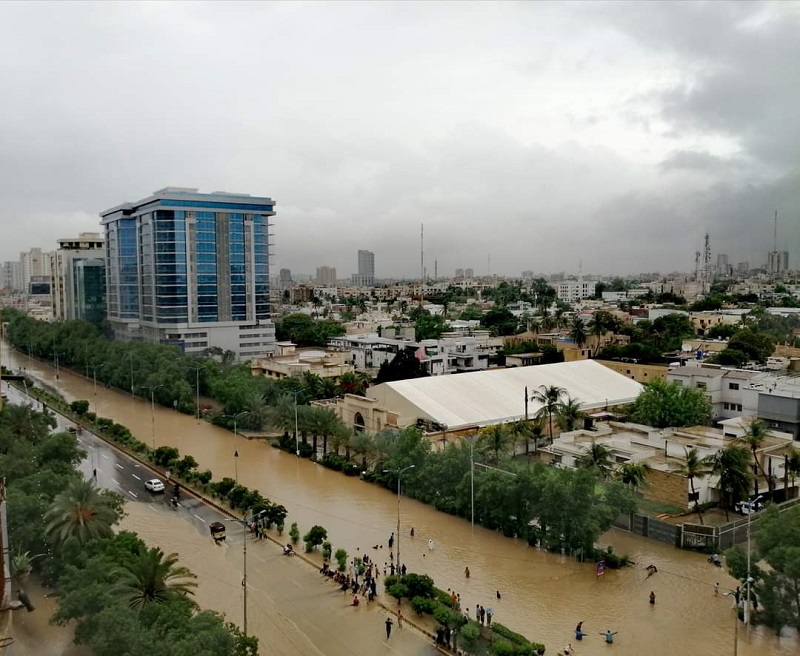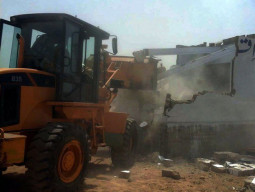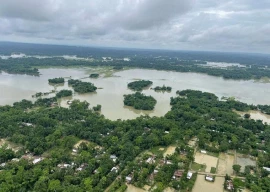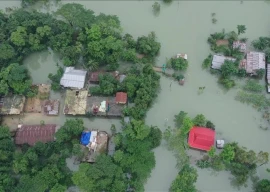
The Pakistan Meteorological Department (PMD) has forecasted torrential rains in Karachi, starting from July 1, marking the start of the monsoon season.
However, if previous monsoons and lack of preparations for the drencher are any indication, it is feared that the impending cloudbursts may once again spell havoc for the port city.
A survey of the city reveals that Karachi’s drainage infrastructure hasn’t seen much beyond ad hoc repairs in the past many years, despite each monsoon spell serving as an annual reminder.
There are over 540 small and large small drains scattered across the provincial capital, most of which are clogged with garbage and haven’t been cleaned in a while, raising the possibility of urban flooding reminiscent of what the city experienced in 2020.
It appears that the steps taken by the Sindh government to address these threats have been rather inadequate. The six-member committee set up by the provincial government to clean the storm drains has no focal person. The committee includes Sindh Solid Waste Management Board Managing Director Zubair Channa, Karachi’s Municipal Commissioner Afzal Zaidi, and other officials of local bodies.
As per Local Government Minister and Coordinator Ram Chandra, who is part of the committee, there are 42 major drains in the city while there are 500 small drains.
“Work on rain water drainage began on May 21 and is ongoing. The work of cleaning the big storm drains is in full swing. Debris is not left around drains during cleaning. About 200 dumpers are picking up garbage daily. The district municipal corporations are not cleaning their small drains so we have been given this responsibility which is a difficult task,” he said, speaking of the government’s on-going but lackluster efforts. Ram Chandra believes that cleaning Karachi’s storm drains in one go is an elephantine task, as garbage tends to return in a matter of days. Which is why, he says, the cleaning efforts will have to continue throughout the season to keep the drains from being clogged.
“So far, we believe that if Karachi sees intermittent rain spells, it shouldn’t be any issue. However, continuous spells of torrential rain can flood the roads, but our teams are also ready to pump away the water if that happens,” he told, denying the possibility of a 2020-like flooding this year, citing improvement in city infrastructure from reconstruction of three major drains and on-going cleaning of several others.
According to relevant local government officials, the funds provided by the federal government have been used to clear out almost all the encroachments and leased structures along the city’s three major nallas, under the right of way for construction of roads.
These included Mahmoodabad Nalla, Orangi Nalla and Gujjar Nalla.
“Mahmudabad drain has been restructured. From here, the water board’s sewerage lines have been disconnected and separate sewerage lines have been installed. Reconstruction of Mahmoodabad Nalla has been completed while cleaning and reconstruction of Orangi Nalla and Gujjar Nalla is in progress,” informed one of the officials. However, despite the provincial government’s reassurances, it must be considered that the city is likely to experience 30 per cent more rainfall this season.
Urban Planner Muhammad Tawheed was of the opinion that the reconstruction work of two major and important nallas in Karachi, Gujjar Nala and Orangi Nala has not been completed yet.
Tawheed believes that despite claims of all the reconstruction works, the government’s poor planning is most evident in its flawed designs. “For, these reasons, it is feared that half of the city will be submerged during the expected torrential rains,” the urban planner maintained, adding that the government should get in the habit of conducting extensive surveys before making plans to avoid such design flaws.

1719660634-1/BeFunky-collage-nicole-(1)1719660634-1-405x300.webp)

1732276540-0/kim-(10)1732276540-0-165x106.webp)

1732274008-0/Ariana-Grande-and-Kristin-Chenoweth-(1)1732274008-0-165x106.webp)
















COMMENTS
Comments are moderated and generally will be posted if they are on-topic and not abusive.
For more information, please see our Comments FAQ